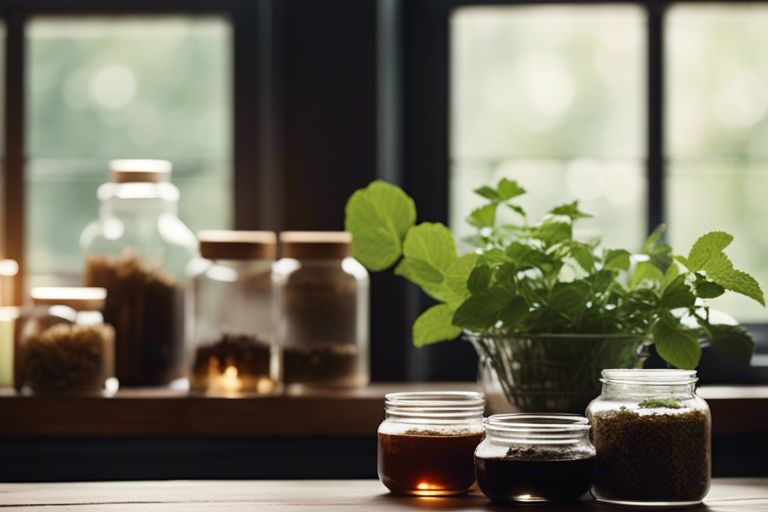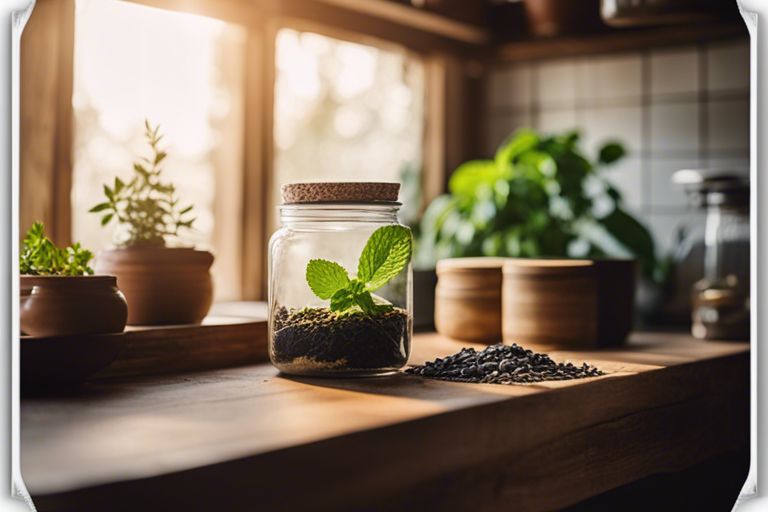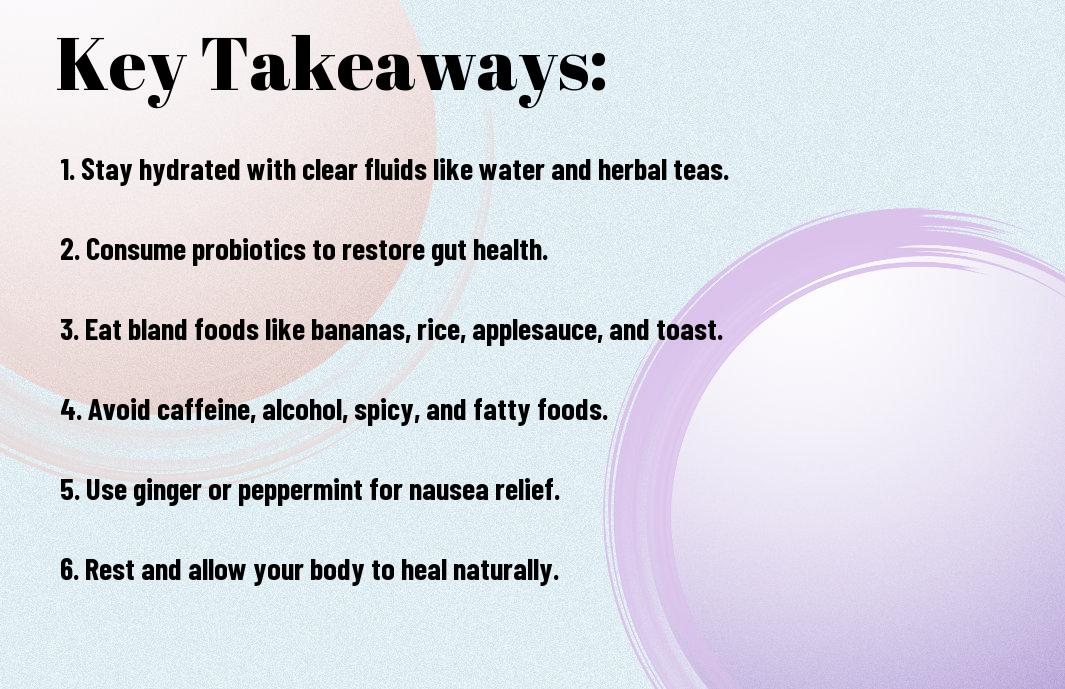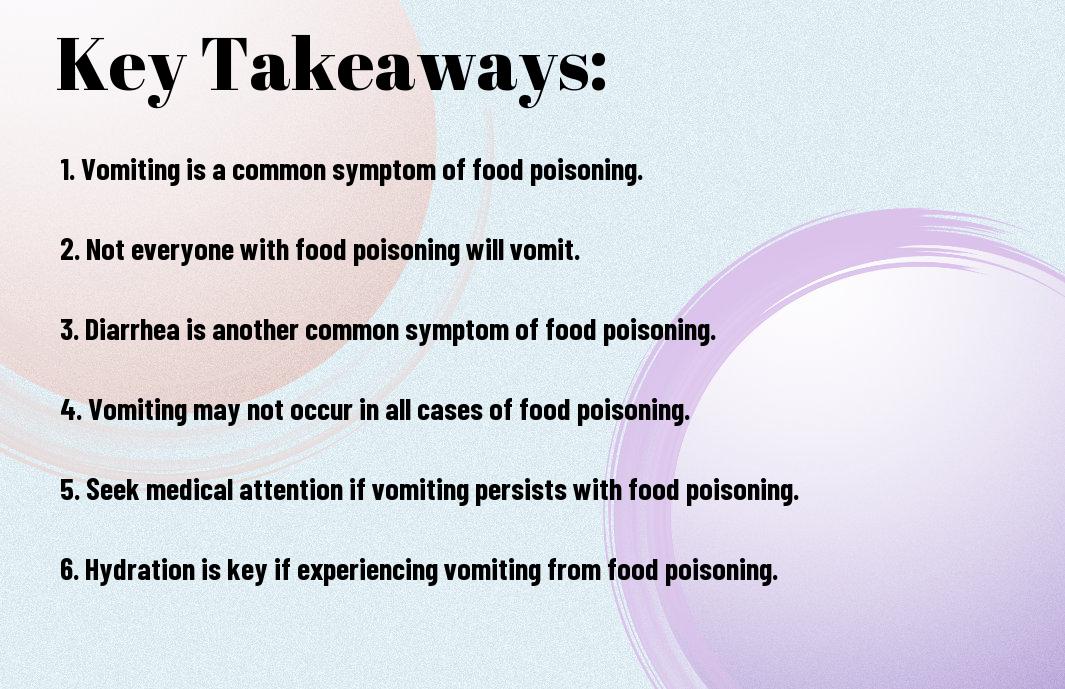It’s crucial to understand how to manage food poisoning effectively, as this common ailment can disrupt your daily life. You may experience symptoms like nausea, vomiting, diarrhea, and abdominal pain, all of which can be uncomfortable. In this blog post, you’ll learn about various over-the-counter medications and home remedies that can help alleviate your symptoms, allowing you to recover more quickly and safely. Knowing the right treatment options is key to getting back on your feet and feeling your best.
Key Takeaways:
- Hydration: Staying hydrated is crucial; consider electrolyte solutions or sports drinks to replace lost fluids.
- Over-the-counter medications: Antidiarrheal medications like loperamide can help control symptoms but should be used with caution.
- Rest: Allowing your body to rest helps facilitate recovery and can shorten the duration of symptoms.
- Avoid certain medications: Avoid taking antibiotics unless prescribed by a doctor, as they may not be effective for all types of food poisoning.
- Consult a doctor: Seek medical attention if symptoms persist or worsen, indicating a more serious condition.

Understanding Food Poisoning
While food poisoning can often be a distressing experience, having a clear understanding of its causes, symptoms, and diagnosis can help you address this issue more effectively. Food poisoning occurs when you consume contaminated food or beverages, leading to gastrointestinal distress. It’s crucial to recognize the factors that contribute to foodborne illnesses, enabling you to make safer food choices in the future.
Causes of Food Poisoning
For many people, food poisoning is primarily caused by pathogenic bacteria, viruses, or parasites. Common culprits include Salmonella, E. coli, and Norovirus, which can infiltrate food through improper handling, undercooking, or cross-contamination. Additionally, consuming unpasteurized dairy products or raw seafood increases the risk of foodborne illnesses. Understanding these causes can empower you to take preventative measures in your kitchen.
Symptoms and Diagnosis
Understanding the symptoms of food poisoning can help you identify whether you are suffering from this condition. Symptoms typically include nausea, vomiting, diarrhea, abdominal cramps, and sometimes fever. These symptoms can appear anywhere from hours to several days after consuming contaminated food. It’s vital to monitor how you feel and seek medical attention if symptoms persist or worsen.
Understanding the diagnosis of food poisoning often requires a thorough evaluation of your symptoms and a history of your recent food consumption. Your healthcare provider may ask about your diet, the timing of symptoms, and any potential exposure to contaminated food. In some cases, stool tests may be conducted to identify the specific pathogen responsible for your illness. Being aware of these diagnostic steps can help you communicate effectively with your healthcare provider.
Over-the-Counter Medications
If you suspect you have food poisoning, it’s crucial to manage your symptoms effectively. Over-the-counter medications can help alleviate discomfort and speed up your recovery. For detailed guidance, check out this resource on 7 Food Poisoning Medications for a Speedy Recovery.
Antiemetics for Nausea
Over-the-counter antiemetics such as meclizine can help you combat nausea and vomiting associated with food poisoning. By reducing the feeling of queasiness, these medications allow you to rest and recover more comfortably.
Antidiarrheal Medications
Any over-the-counter antidiarrheal medications, such as loperamide, can help you manage diarrhea caused by food poisoning. These medications work by slowing down your gut movements, allowing for better fluid absorption.
To effectively use antidiarrheal medications, it is crucial to address the underlying cause of your symptoms. While these medications can provide relief, they should not be used if you have a high fever or bloody stools, as they may worsen certain conditions.
Pain Relievers
Pain relievers like acetaminophen can help reduce any discomfort you may experience during food poisoning, including headaches and body aches. They can provide much-needed relief, allowing you to focus on your recovery.
Medications for pain relief are typically safe and effective, but you should always ensure they are suitable for you. Be mindful of your body’s signals and avoid self-medicating excessively, as this can lead to additional complications.
Prescription Medications
Now, it’s crucial to recognize that while most cases of food poisoning resolve on their own, certain situations may require prescription medications to help alleviate symptoms and promote recovery. This chapter will discuss the types of prescription medications you may need based on the underlying cause of your food poisoning.
Antibiotics for Bacterial Infections
The use of antibiotics is primarily effective for food poisoning caused by specific bacterial infections, such as Salmonella or Campylobacter. Your doctor may prescribe antibiotics if your symptoms are severe or if you are at risk for complications, especially if you have underlying health concerns or a weakened immune system.
Antiviral Medications
Infections caused by certain viruses, like norovirus, may require antiviral medications. These medications can help reduce the severity and duration of your symptoms, allowing you to recover more quickly. It’s crucial to consult with your healthcare provider before starting any antiviral treatment, as they will determine the most appropriate course of action for your specific situation.
Plus, while antivirals can be effective, they are not universally prescribed for all viral infections associated with food poisoning. It’s crucial to have a thorough evaluation by your healthcare professional to ensure that you’re receiving the most suitable medication for your condition.
Medications for Specific Parasites
Antiviral treatments are not your only option; certain parasitic infections resulting from contaminated food may also require specialized medications targeting the parasites responsible.
Medications for specific parasites typically include antiparasitic drugs that are tailored to the type of infection you may have acquired. These medications are vital for effectively clearing the infection and alleviating your symptoms, particularly if you’ve exhibited prolonged gastrointestinal distress after suspected food poisoning. Always consult your healthcare provider to ensure you receive the appropriate treatment based on the type of parasite involved.
Home Remedies and Supportive Care
To effectively manage food poisoning, it’s vital to incorporate home remedies and supportive care into your recovery plan. This approach not only addresses symptoms but also promotes your overall well-being during this uncomfortable time.
Hydration and Electrolyte Replacement
Care is important when it comes to hydration. Food poisoning often leads to vomiting and diarrhea, which can result in significant fluid loss. It’s crucial to replenish these lost fluids by drinking clear liquids such as water, broth, or electrolyte solutions. Be sure to sip slowly to avoid further irritation to your stomach.
Rest and Recovery Techniques
Supportive care also includes ample rest. Your body requires energy to fight off the infection causing your symptoms, so listening to your body’s need for sleep and relaxation is vital during recovery.
Techniques for enhancing your recovery involve creating a calm environment and engaging in light activities only. Use pillows to support your body while resting, and practice deep-breathing exercises to relieve discomfort. Gentle stretches may also help ease muscle tension, but remember to prioritize rest over exertion to allow your body to heal efficiently.

Final Words
So, when it comes to managing food poisoning, over-the-counter medications like loperamide can provide relief from diarrhea, while acetaminophen can help alleviate fever and body aches. However, it’s crucial to stay hydrated and consult a healthcare professional if your symptoms persist or worsen. For more detailed guidance, you can refer to the Treatment for Food Poisoning – NIDDK for reliable information and suggestions tailored to your specific situation.
FAQ
Q: What are the most common medicines used to treat food poisoning?
A: The treatment for food poisoning primarily focuses on relieving symptoms rather than targeting the infection itself, as most cases resolve on their own. Common over-the-counter medications include anti-nausea medications like meclizine or dimenhydrinate, and anti-diarrheal medications such as loperamide (Imodium). However, it’s important to use these medications with caution, particularly if diarrhea is severe, as they can sometimes prolong the illness. In cases where the food poisoning is caused by bacteria like Salmonella or E. coli, antibiotics may be necessary, but they are typically prescribed by a healthcare provider based on specific circumstances.
Q: Are there any natural remedies I can take for food poisoning?
A: Yes, there are several natural remedies that can help alleviate the symptoms of food poisoning. Ginger tea is widely recognized for its anti-nausea properties and can be very helpful. Additionally, peppermint can soothe stomach discomfort and help reduce nausea. Staying hydrated with clear fluids, such as water, broth, and electrolyte solutions, is crucial for recovery. Probiotics, found in supplements or fermented foods like yogurt and kefir, may also help restore gut health. However, it’s important to consult with a healthcare professional before trying these remedies, especially in severe cases of food poisoning.
Q: When should I see a doctor for food poisoning?
A: You should seek medical attention if you experience severe symptoms that do not improve within 24 hours or if you have symptoms such as high fever (over 101.5°F), blood in your stool, persistent vomiting that prevents you from keeping liquids down, signs of dehydration (such as dry mouth, extreme thirst, little or no urination, or dizziness), or if you are pregnant, elderly, or have a weakened immune system. These symptoms could indicate a more serious infection or complications that require medical treatment, such as intravenous fluids or prescription medications.


















